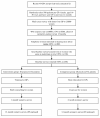Women's evaluation of abuse and violence care in general practice: a cluster randomised controlled trial (weave)
- PMID: 20044929
- PMCID: PMC2823699
- DOI: 10.1186/1471-2458-10-2
Women's evaluation of abuse and violence care in general practice: a cluster randomised controlled trial (weave)
Abstract
Background: Intimate partner abuse (IPA) is a major public health problem with serious implications for the physical and psychosocial wellbeing of women, particularly women of child-bearing age. It is a common, hidden problem in general practice and has been under-researched in this setting. Opportunities for early intervention and support in primary care need to be investigated given the frequency of contact women have with general practice. Despite the high prevalence and health consequences of abuse, there is insufficient evidence for screening in primary care settings. Furthermore, there is little rigorous evidence to guide general practitioners (GPs) in responding to women identified as experiencing partner abuse. This paper describes the design of a trial of a general practice-based intervention consisting of screening for fear of partner with feedback to GPs, training for GPs, brief counselling for women and minimal practice organisational change. It examines the effect on women's quality of life, mental health and safety behaviours.
Methods/design: weave is a cluster randomised controlled trial involving 40 general practices in Victoria, Australia. Approximately 500 women (16-50 years) seen by the GP in the previous year are mailed a short lifestyle survey containing an item to screen for IPA. Women who indicate that they were afraid of a partner/ex-partner in the last year and provide contact details are invited to participate. Once baseline data are collected, GPs are randomly assigned to either a group involving healthy relationship and responding to IPA training plus inviting women for up to 6 sessions of counselling or to a group involving basic education and usual care for women. Outcomes will be evaluated by postal survey at 6 and 12 months following delivery of the intervention. There will be an economic evaluation, and process evaluation involving interviews with women and GPs, to inform understanding about implementation and outcomes.
Discussion: The weave trial responds to an urgent need for more evidence on what can be achieved in primary care with regard to responding to women who experience IPA. It will provide important knowledge about the effectiveness of a brief method of screening, professional IPA training program and brief counselling for women.
Trial registration: [ACTRN12608000032358].
Figures
References
-
- Tjaden P, Thoennes N. Extent, Nature, and Consequences of Intimate Partner Violence. Washington: US Dept of Justice; 2000. pp. 1–62.
Publication types
MeSH terms
LinkOut - more resources
Full Text Sources



